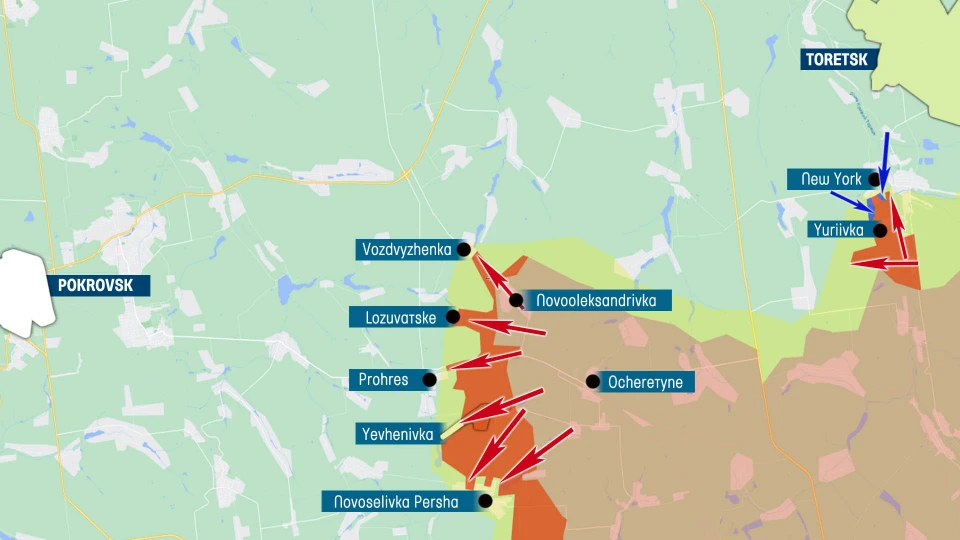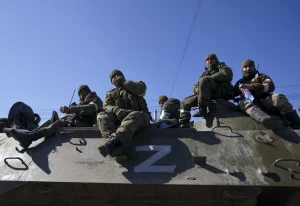
Ukraine's drone attacks on Russia, situation in Pokrovsk sector. Serhiy Zgurets’ column
Discussing the large-scale Ukrainian drone attacks on targets in at least five Russian regions, the findings from the British RUSI Institute, Ukraine's strategy for the 2024 war, and the fighting in the Pokrovsk area
Ukrainian drone strikes in Russia
Late last night, long-range attack drones launched a massive strike on several targets within Russia. The Russian Defense Ministry "heroically" reported shooting down nearly 80 drones, claiming 47 were intercepted over the Rostov region, one each over Belgorod, Voronezh, and Smolensk regions, 8 over Kuban, and 17 over the Black and Azov Seas. I think we'll see the real impact of these attacks later, but at least two UAVs hit their targets, according to photos and videos.
The first target was the oil refinery in Tuapse (Russia's Krasnodar region). There were two waves of drone attacks, with video showing a drone slowly descending and hitting its target, followed by an explosion. In total, at least eight UAVs reportedly attacked the refinery. The extent of the damage is still being clarified. The operation was conducted by the Main Intelligence Directorate, according to several sources. About 90% of this refinery’s products were intended for export, and this is the third attack on this facility, with previous attacks in January and May of this year. Air defense around this refinery remains nonexistent, which is actually a good thing.
The second target attacked by a Ukrainian drone was the Morozovsk airfield in the Rostov region, about 300 km from the current front line. It is home to the 559th Russian Bomber Aviation Regiment with Su-34 and Su-24 aircraft. There are images of smoke rising from this airfield and reports of explosions. Local sources reported eight explosions. In April, this airfield was also attacked by drones operated by Ukraine's Security Service and the Armed Forces, resulting in the destruction or damage of at least six aircraft.
RUSI analysts' report on the Ukrainian Armed Forces' counteroffensive last year
Amid these systematic attacks by Ukrainian UAVs on enemy targets deep within Russian territory, it’s worth mentioning a report by the Royal United Services Institute (RUSI). This respected British institute analyzes military operations. Recently, it released a report on the reasons behind the failure of Ukraine's counteroffensive in 2023, written in collaboration with the Ukrainian Armed Forces’ General Staff. The report explicitly states that it is not advisable for Ukraine to resume offensive operations in the near future. Why? In short, it argues that given the current realities—such as the shortage of weapons for 14 reserve brigades, ongoing enemy assaults, Russia's ample human resources, and the restrictions on the full-range use of some types of foreign weaponry—another counteroffensive under these conditions would likely be a futile repeat, according to RUSI experts.
The report notes that while resources for future offensive actions are being accumulated, Ukraine should adopt a strategy of inflicting maximum losses on Russia both on the battlefield and in the rear. The Kremlin's ability to continue its aggression relies on financial reserves used to pay troops and produce weapons. Therefore, strikes like those carried out by Ukrainian drones on oil refineries and military-industrial targets deep within Russia are components of a war of attrition that Ukraine must effectively execute this year. At the same time, Ukraine needs to recruit, equip, and prepare its forces more thoroughly and with a better understanding of the battlefield realities.
Situation in the Pokrovsk sector
One day ago on the battlefield, there were 117 combat clashes, with 39 in the Pokrovsk direction. We know that on July 19-20, the Russian forces managed to enter the destroyed settlement of Prohres, which somewhat impacted the situation in this area.
Ivan Sekach, the Chief of Public Relations for the 110th Separate Mechanized Brigade, said that the Russian forces continue a creeping advance, fighting fiercely for every position.
"Currently, the action has shifted a bit north because the salient where our brigade stands, in the Novooleksandrivka direction, is very inconvenient for the enemy as it’s exposed to fire from both flanks. FPV drones are also in operation. The terrain is challenging with a hill, making further advance difficult for them. They are now trying to level the front, which is why more activity has shifted north. They're deploying more equipment there, but a fresh Russian brigade has also arrived in our direction. It's likely some airborne troops because they have BMP-3s and 'Crocodiles' – armored KrAZ vehicles. Recently, they attempted an assault, moving quickly. They managed to breach our first line of defense, but out of seven vehicles, only three returned; the rest were destroyed," Sekach said.
According to him, the main problem in the Pokrovsk sector now is the Russian forces' advantage in personnel numbers. This leads to small-scale assaults, where it's impractical to use artillery against just a few soldiers, and FPV drones can’t reach everywhere.
Regarding the Pokrovsk-Kostiantynivka road near Vozdvyzhenka, where Russian forces are advancing, Sekach mentioned that the road is passable but there are issues with Russian FPV drones and guided bombs reaching that area. Currently, the Russian forces are not using artillery there.

"The terrain there is inconvenient; they’ve hit a dead end at Vozdvyzhenka. I’ve been there, and the hill covers one side with a lake, making it disadvantageous for them to expand either left or right. They're trying to advance from Prohres, moving from below. The Russians are acting based on where they can advance; where they can't, they start conserving resources," explained Sekach.
In terms of equipment, the Russian troops in the Pokrovsk sector are experiencing a shortage, so they don’t use it frequently. They don’t lack infantry, unlike the Ukrainian army.
Sekach explained that the Ukrainian Defense Forces are using remote mining with Vampire UAVs and engineering troops, but the front line is so fluid that there’s a lot of work to do. There are also emerging issues with the availability of mining equipment: "We have new developments that are very effective, but there aren’t many of them. If we had more, it would be much harder for the enemy to advance."
Another problem is Russia's guided bombs. Every 30 minutes, air bombs hit both the front line and civilian infrastructure, including educational institutions. Sekach emphasized that there are no Ukrainian soldiers in these areas.
Despite losses of Su-25 aircraft, Russia continues to use them. The situation is further complicated by reconnaissance drones: "We need to address this because they fly as if they own the place. Sometimes the concentration of reconnaissance drones like Supercam and Orlan can reach 20 units over 20 kilometers, covering every kilometer. This hampers our artillery operations as they can target us accurately. This is a significant issue, and currently, we don’t have a solution. Shooting them down with surface-to-air missiles is very costly, with a single interception costing around $30,000."
At night, the area where the 110th Separate Mechanized Brigade operates is calmer, but assaults continue. The enemy typically attacks around 5 a.m. during twilight when thermal drones are less effective, and daytime drones still have poor visibility. Our troops also follow this tactic, particularly for rotations. The enemy quiets down during the day but becomes active again in the evening.
"This is not special forces, just regular infantry. As for airborne troops, they are not meant for field battles. They need to maintain the initiative and continue the offensive, but they are using all their reserves. The arrival of new equipment means they are running out of old resources, and they’re throwing in their last reserves. We all understand the developing geopolitical situation; they need to maintain the initiative to use it in upcoming negotiations," explained Sekach.
Regarding mobilization, he said, "Indeed, the first wave, a small number of people, has already joined the brigade. The recruitment system changed slightly on June 13, but it’s working. The painful issue is who we lack: infantry. We are short on infantry due to a large number of casualties and the heavy flow of personnel out of service due to intense fighting. Unfortunately, recruiting doesn’t help much here, as not many people want to join the infantry. Therefore, our main reinforcements continue to come through the territorial recruitment centers.”
- News











































